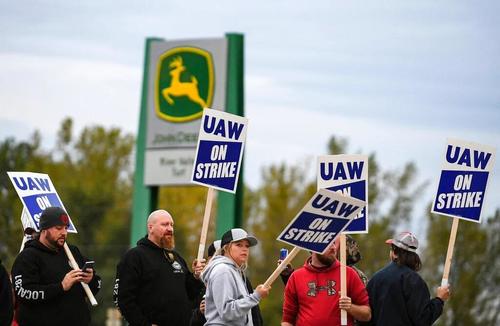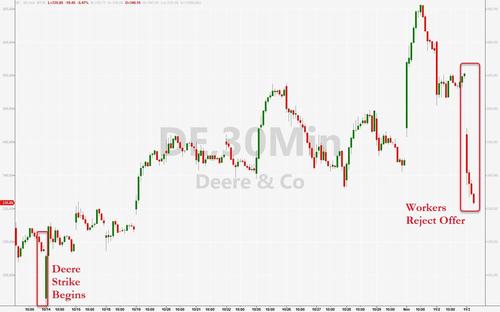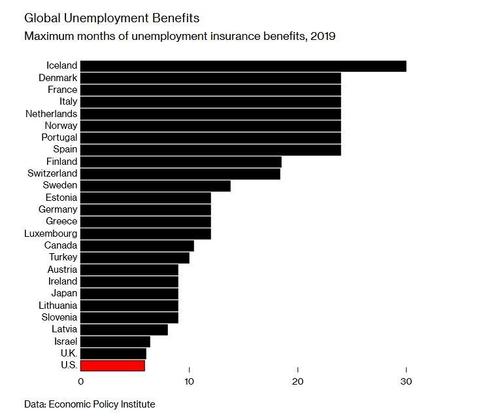Over 10K John Deere Workers Reject Latest Offer As Strike Extends Into Third Week
Over 10,000 striking John Deere workers across 12 facilities have rejected a contract offer which would have included an immediate 10% pay raise and $8,500 ratification bonus per worker, according to AP.

The rejected raises were twice as much as an earlier offer which was declined by United Auto Workers union members last month – sending the strike, which began Oct. 14, into its third week.
“Our members at John Deere strike for the ability to earn a decent living, retire with dignity and establish fair work rules,” Chuck Browning, the director of United Automobile Workers (UAW) union’s agricultural department, said in a statement when the strike began, adding “We stay committed to bargaining until our members’ goals are achieved.”
According to the UAW, the new offer was rejected by 55% to 45%, a slimmer margin than the October vote.
“The strike against John Deere & Company will continue as we discuss next steps with the company,” the union said.
Deere Chief Administration Officer, Mark Howze, pitched the latest offer as a $3.5 billion investment in John Deere employees – and therefore, their communities “to significantly enhance wages and benefits that were already the best and most comprehensive in our industries.”
The rejected agreement would have included a 10% pay raise this year, and 5% increases in the third and fifth years of the deal. In the second, fourth and sixth years, employees would have received lump sum payments equal to 3% of their annual pay, as well as a ratification bonus of $8,500.
“Even though it would have created greater competitive challenges within our industries, we had faith in our employees’ ability to sharpen our competitive edge,” wrote Howze.
Shares in Deere were off sharply on the news:
Power to the people
The Deere strike is just the latest example of who’s really got leverage right now as pandemic benefits end across 26 states. As Bloomberg noted last week;
American workers—the ones involuntarily benched during the pandemic and the ones who labored through it at great risk so others could stay fed or entertained or alive—are now doing their best to be impossible to ignore. Private-sector union members are authorizing strikes at a rate rarely seen in modern America, with more than 100,000 workers recently threatening or mounting work stoppages in health care, higher education, telecommunications, transportation, television, mining, manufacturing, music, metals, oil, carpentry, whiskey, and cereal. The internet dubbed October #Striketober.
Nonunion workers are voting with their feet as well, fueling a labor market reckoning that’s become known as the Great Resignation. On Oct. 12 the U.S. Bureau of Labor Statistics reported that an unprecedented 2.9% of the entire workforce, some 4.3 million people, quit their jobs in the month of August, even as the government was confirming it would nuke extra jobless benefits in hopes of forcing people to work.
The environment is reminiscent of 1945, a period in US history rife with massive strikes by what are now known as “essential workers,” where 10% of the workforce was on strike at one point or another. In response, median pay rose significantly along with productivity.
So far, workers haven’t won much just yet – however #Striketober and ‘the Great Resignation’ has attracted the attention of Congress, according to Judy Conti, director of government affairs at the National Employment Law Project.
“Some members of Congress are absolutely paying attention, and they understand that there’s a different level of worker engagement than ever before,” she says.
Without Covid supplements, U.S. unemployment insurance is meager compared with benefits in peer countries, delivering beneficiaries roughly 40% of their prior income on average—too little to stave off a crisis for those most in need. It also excludes millions of people, including many temps, part-timers, gig workers classified as contractors, undocumented immigrants, and people who quit their jobs because of domestic violence or child-care needs. Also the present system doesn’t require employers to tell workers such a benefit exists. -Bloomberg
Needless to say, whatever Deere employees finally end up with will set the tone for strike negotiations across the country.
Tyler Durden
Wed, 11/03/2021 – 11:44![]()
Zero Hedge’s mission is to widen the scope of financial, economic and political information available to the professional investing public, to skeptically examine and, where necessary, attack the flaccid institution that financial journalism has become, to liberate oppressed knowledge, to provide analysis uninhibited by political constraint and to facilitate information’s unending quest for freedom. Visit https://www.zerohedge.com

